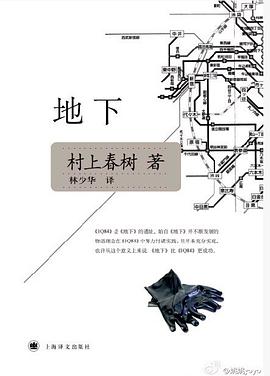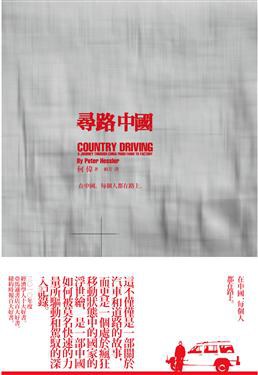紀實
尋路中國 豆瓣
Country Driving
9.0 (8 个评分)
作者:
何偉
译者:
賴芳
八旗文化
2011
- 2
榮獲2010年度
經濟學人十大好書。
亞馬遜書店百大好書。
紐約時報百大好書。
通過什麼來了解中國?何偉(Hessler)這一次選擇了汽車。嘟嘟——這個紐約客記者租了一部美國產的切諾基吉普車,開始了他的尋路中國之旅。在第一部裡,他選擇了沿古代中國橫貫東西的城牆而行(沒錯,它今天被民族主義和愛國主義者塑造為長城),這裡崎嶇難行,本非道路,古老頹敗的城牆承載了古今殊途的意涵:古代它是中國抵禦胡人的工具,今天抵禦胡人的城堡沒落荒廢,人們沿著新修的路去了南方尋找機會。第二部裡,汽車潮和旅遊熱沿著新開的道路湧向了長城腳下作者居住了二載的一個鄉村,他透過這個叫做三岔的村莊,具體而微地呈現了新興商業力量和傳統政治力量如何左右它,如何左右這裡的村民。第三部裡,他沿著十車道高速公路來到一個個南方雨後春筍般混亂成長的工業城市,圍繞著一台山寨版胸罩調節扣機器發生的諸多有趣故事,他明白了什麼是中國版本的工業革命。還有什麼比這更不可思議呢?一座座山被削平變成了工廠,種植柑橘和小麥的手開始給女人做胸罩,成功就在眼前,如果不沿著路往前走,就無法抵達,而更主要的是,他們已經無法返回。
本書最打動讀者的是對眾生深入到本質的刻畫,何偉真實再現了這個時代裡很多中國人特有的空洞感:周遭變化太快,應接不暇,為之所累,而迅速的變化也帶來了太多的不確定。簡言之,這不是一個關於汽車和道路的故事,而是一部處於瘋狂移動狀態中的國家的浮世繪,更是一部中國如何被莫名快速的力量所驅動和駕馭的深入記錄。是的,在中國,每個人都在路上。
「誰能弄明白這樣一個世界?」
我們向正在努力尋找答案的何偉表示感謝。
經濟學人十大好書。
亞馬遜書店百大好書。
紐約時報百大好書。
通過什麼來了解中國?何偉(Hessler)這一次選擇了汽車。嘟嘟——這個紐約客記者租了一部美國產的切諾基吉普車,開始了他的尋路中國之旅。在第一部裡,他選擇了沿古代中國橫貫東西的城牆而行(沒錯,它今天被民族主義和愛國主義者塑造為長城),這裡崎嶇難行,本非道路,古老頹敗的城牆承載了古今殊途的意涵:古代它是中國抵禦胡人的工具,今天抵禦胡人的城堡沒落荒廢,人們沿著新修的路去了南方尋找機會。第二部裡,汽車潮和旅遊熱沿著新開的道路湧向了長城腳下作者居住了二載的一個鄉村,他透過這個叫做三岔的村莊,具體而微地呈現了新興商業力量和傳統政治力量如何左右它,如何左右這裡的村民。第三部裡,他沿著十車道高速公路來到一個個南方雨後春筍般混亂成長的工業城市,圍繞著一台山寨版胸罩調節扣機器發生的諸多有趣故事,他明白了什麼是中國版本的工業革命。還有什麼比這更不可思議呢?一座座山被削平變成了工廠,種植柑橘和小麥的手開始給女人做胸罩,成功就在眼前,如果不沿著路往前走,就無法抵達,而更主要的是,他們已經無法返回。
本書最打動讀者的是對眾生深入到本質的刻畫,何偉真實再現了這個時代裡很多中國人特有的空洞感:周遭變化太快,應接不暇,為之所累,而迅速的變化也帶來了太多的不確定。簡言之,這不是一個關於汽車和道路的故事,而是一部處於瘋狂移動狀態中的國家的浮世繪,更是一部中國如何被莫名快速的力量所驅動和駕馭的深入記錄。是的,在中國,每個人都在路上。
「誰能弄明白這樣一個世界?」
我們向正在努力尋找答案的何偉表示感謝。
江城 豆瓣 豆瓣
River Town
9.4 (489 个评分)
作者:
[美国] 彼得·海斯勒
译者:
李雪顺
上海译文出版社
2012
- 1
1996年8月底一个温热而清朗的夜晚,我从重庆出发,乘慢船,顺江而下来到涪陵。
涪陵没有铁路,历来是四川省的贫困地区,公路非常糟糕。去哪里你都得坐船,但多半你哪里也不会去。在随后的两年,这座城市就是我的家。
在这里,我有时是一个旁观者,有时又置身于当地的生活之中,这种亲疏结合的观察构成了我在四川停留两年的部分生活。
2001年,也就是这本书在美国出版的时候,一条通往重庆的高速公路通车了,一条铁路也正在修建之中,基本上再也没有人坐船去涪陵了。这座城市正在飞速发展着,在过去的二十年,那样一种转型变化的感觉——接二连三、冷酷无情、势不可挡——正是中国的本质特征。很难相信,这个国家曾经完全是另外一种模样,是19世纪西方人眼中“永远停滞的民族”。
2003年,三峡大坝一期完工后,不断上涨的江水将陆续淹没那些江畔之城,这多少令我有些伤感。而对于大多数中国人来说,这正是不断变革的对应面:贫穷、烂路、慢船。
这并不是一本关于中国的书,它只涉及一小段特定时期内中国的某个小地方。从地理和历史上看,涪陵都位于江河中游,所以人们有时很难看清她从何而来,又去往何处。
在1996年至1998年间,我学会了热爱涪陵。能再次回到长江上的感觉真好,哪怕它的旧时激流只存于我的记忆之中。
涪陵没有铁路,历来是四川省的贫困地区,公路非常糟糕。去哪里你都得坐船,但多半你哪里也不会去。在随后的两年,这座城市就是我的家。
在这里,我有时是一个旁观者,有时又置身于当地的生活之中,这种亲疏结合的观察构成了我在四川停留两年的部分生活。
2001年,也就是这本书在美国出版的时候,一条通往重庆的高速公路通车了,一条铁路也正在修建之中,基本上再也没有人坐船去涪陵了。这座城市正在飞速发展着,在过去的二十年,那样一种转型变化的感觉——接二连三、冷酷无情、势不可挡——正是中国的本质特征。很难相信,这个国家曾经完全是另外一种模样,是19世纪西方人眼中“永远停滞的民族”。
2003年,三峡大坝一期完工后,不断上涨的江水将陆续淹没那些江畔之城,这多少令我有些伤感。而对于大多数中国人来说,这正是不断变革的对应面:贫穷、烂路、慢船。
这并不是一本关于中国的书,它只涉及一小段特定时期内中国的某个小地方。从地理和历史上看,涪陵都位于江河中游,所以人们有时很难看清她从何而来,又去往何处。
在1996年至1998年间,我学会了热爱涪陵。能再次回到长江上的感觉真好,哪怕它的旧时激流只存于我的记忆之中。
Hillbilly Elegy 豆瓣 Goodreads
7.0 (23 个评分)
作者:
J. D. Vance
Harper
2016
- 6
#1 NEW YORK TIMES BESTSELLER, NAMED BY THE TIMES AS ONE OF "6 BOOKS TO HELP UNDERSTAND TRUMP'S WIN"
"You will not read a more important book about America this year."—The Economist
"A riveting book."—The Wall Street Journal
"Essential reading."—David Brooks, New York Times
From a former marine and Yale Law School graduate, a powerful account of growing up in a poor Rust Belt town that offers a broader, probing look at the struggles of America’s white working class
Hillbilly Elegy is a passionate and personal analysis of a culture in crisis—that of white working-class Americans. The decline of this group, a demographic of our country that has been slowly disintegrating over forty years, has been reported on with growing frequency and alarm, but has never before been written about as searingly from the inside. J. D. Vance tells the true story of what a social, regional, and class decline feels like when you were born with it hung around your neck.
The Vance family story begins hopefully in postwar America. J. D.’s grandparents were “dirt poor and in love,” and moved north from Kentucky’s Appalachia region to Ohio in the hopes of escaping the dreadful poverty around them. They raised a middle-class family, and eventually their grandchild (the author) would graduate from Yale Law School, a conventional marker of their success in achieving generational upward mobility.
But as the family saga of Hillbilly Elegy plays out, we learn that this is only the short, superficial version. Vance’s grandparents, aunt, uncle, sister, and, most of all, his mother, struggled profoundly with the demands of their new middle-class life, and were never able to fully escape the legacy of abuse, alcoholism, poverty, and trauma so characteristic of their part of America. Vance piercingly shows how he himself still carries around the demons of their chaotic family history.
A deeply moving memoir with its share of humor and vividly colorful figures, Hillbilly Elegy is the story of how upward mobility really feels. And it is an urgent and troubling meditation on the loss of the American dream for a large segment of this country.
"You will not read a more important book about America this year."—The Economist
"A riveting book."—The Wall Street Journal
"Essential reading."—David Brooks, New York Times
From a former marine and Yale Law School graduate, a powerful account of growing up in a poor Rust Belt town that offers a broader, probing look at the struggles of America’s white working class
Hillbilly Elegy is a passionate and personal analysis of a culture in crisis—that of white working-class Americans. The decline of this group, a demographic of our country that has been slowly disintegrating over forty years, has been reported on with growing frequency and alarm, but has never before been written about as searingly from the inside. J. D. Vance tells the true story of what a social, regional, and class decline feels like when you were born with it hung around your neck.
The Vance family story begins hopefully in postwar America. J. D.’s grandparents were “dirt poor and in love,” and moved north from Kentucky’s Appalachia region to Ohio in the hopes of escaping the dreadful poverty around them. They raised a middle-class family, and eventually their grandchild (the author) would graduate from Yale Law School, a conventional marker of their success in achieving generational upward mobility.
But as the family saga of Hillbilly Elegy plays out, we learn that this is only the short, superficial version. Vance’s grandparents, aunt, uncle, sister, and, most of all, his mother, struggled profoundly with the demands of their new middle-class life, and were never able to fully escape the legacy of abuse, alcoholism, poverty, and trauma so characteristic of their part of America. Vance piercingly shows how he himself still carries around the demons of their chaotic family history.
A deeply moving memoir with its share of humor and vividly colorful figures, Hillbilly Elegy is the story of how upward mobility really feels. And it is an urgent and troubling meditation on the loss of the American dream for a large segment of this country.





